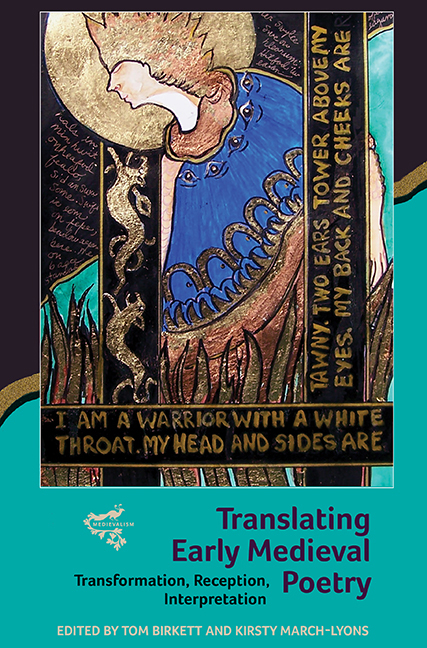Book contents
- Frontmatter
- Contents
- Acknowledgements
- Contributors
- Introduction: From Eald to New
- 1 From Eald Old to New Old: Translating Old English Poetry in(to) the Twenty-first Century
- 2 Edwin Morgan's Translations of Anglo-Saxon Poetry: Turning Eald into New in English and Scots
- 3 Gains and Losses in Translating Old English Poetry into Modern English and Russian
- 4 Borges, Old English Poetry and Translation Studies
- 5 ‘Let Beowulf now be a book from Ireland’: What Would Henryson or Tolkien Say?
- 6 The Forms and Functions of Medieval Irish Poetry and the Limitations of Modern Aesthetics
- 7 Aislinge Meic Conglinne: Challenges for Translator and Audience
- 8 Translating Find and the Phantoms into Modern Irish
- 9 Reawakening Angantýr: English Translations of an Old Norse Poem from the Eighteenth Century to the Twenty-first
- 10 Translating and Retranslating the Poetic Edda
- 11 From Heroic Lay to Victorian Novel: Old Norse Poetry about Brynhildr and Thomas Hardy's The Return of the Native
- 12 Michael Hirst's Vikings and Old Norse Poetry
- Afterword
- A Translation of Riddle 15 from the Exeter Book
- Bibliography
- Index
- Miscellaneous Endmatter
Introduction: From Eald to New
Published online by Cambridge University Press: 01 September 2018
- Frontmatter
- Contents
- Acknowledgements
- Contributors
- Introduction: From Eald to New
- 1 From Eald Old to New Old: Translating Old English Poetry in(to) the Twenty-first Century
- 2 Edwin Morgan's Translations of Anglo-Saxon Poetry: Turning Eald into New in English and Scots
- 3 Gains and Losses in Translating Old English Poetry into Modern English and Russian
- 4 Borges, Old English Poetry and Translation Studies
- 5 ‘Let Beowulf now be a book from Ireland’: What Would Henryson or Tolkien Say?
- 6 The Forms and Functions of Medieval Irish Poetry and the Limitations of Modern Aesthetics
- 7 Aislinge Meic Conglinne: Challenges for Translator and Audience
- 8 Translating Find and the Phantoms into Modern Irish
- 9 Reawakening Angantýr: English Translations of an Old Norse Poem from the Eighteenth Century to the Twenty-first
- 10 Translating and Retranslating the Poetic Edda
- 11 From Heroic Lay to Victorian Novel: Old Norse Poetry about Brynhildr and Thomas Hardy's The Return of the Native
- 12 Michael Hirst's Vikings and Old Norse Poetry
- Afterword
- A Translation of Riddle 15 from the Exeter Book
- Bibliography
- Index
- Miscellaneous Endmatter
Summary
WHEN THE WORD Exchange: Anglo-Saxon Poems in Translation was published in 2010, its ‘spirit of collaboration and creativity’ and productive juxtaposition of diverse poetic voices challenged the academy to rethink how Old English poetry should be approached. Here was a collection of Old English poems translated by poets with very different knowledge of the material: some came to the project able to translate directly from Old English (or like Bernard O'Donoghue, translate certain poems from memory), whilst others needed the aid of prose translations, crib sheets and the careful guidance of the editors (the poet A. E. Stallings quips: ‘I have no Anglo-Saxon, except inasmuch as I speak English’). All of the translations sought to make early medieval poetry accessible and contemporary, and the collection as a whole demonstrates the full range of possibilities that Old English poetry offers to the poet writing for a twenty-firstcentury audience.
This particular anthology's endeavour to match the Old English corpus with ‘a word-hoard of our times’ is also representative of a wider resurgence in attention to early medieval poetry, a rekindling of interest that has seen a succession of high-profile translations including Ciarán Carson's version of the Tain Bo Cuailnge for Penguin Classics; a new translation of the Poetic Edda by Andy Orchard for Penguin, by Jackson Crawford for Hackett, and a revised version of Carolyne Larrington's translation of the same for Oxford World's Classics; and the arrival of Tolkien's long-awaited translation of Beowulf into an already crowded market. The passing of Seamus Heaney in 2013 also saw renewed attention to his merits as a translator, and particularly to his own much-lauded translation of Beowulf, which was serialised as BBC Radio 4's ‘Book of the Week’ following his death; the original Old English poem continues to be reinterpreted in every imaginable medium. The successful ‘Modern Poets on Old Norse Poetry’ and ‘Kennings in the Community’ initiatives in the UK have led to some extraordinary reworkings of skaldic verse by contemporary poets, and the hit series Vikings has seen Old Norse poetry recited in living rooms across the world.
- Type
- Chapter
- Information
- Translating Early Medieval PoetryTransformation, Reception, Interpretation, pp. 1 - 12Publisher: Boydell & BrewerPrint publication year: 2017

